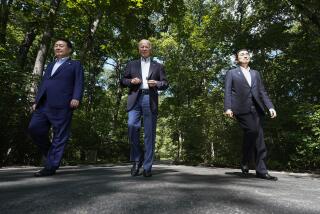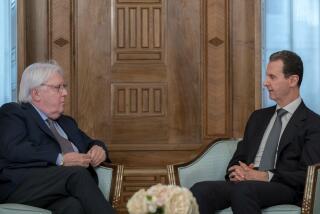Barak, Arafat Make Peace Overtures to Foes
- Share via
THURMONT, Md. — Israeli Prime Minister Ehud Barak and Palestinian Authority President Yasser Arafat reached out to political rivals Thursday, apparently hoping to broaden their support in advance of the referendums both men have promised to hold if their Camp David summit produces a peace treaty.
Barak added Dan Meridor, a former senior member of the opposition Likud Party, to the official Israeli delegation at the summit. At the same time, Arafat sought a high-profile meeting at Camp David with three Palestinian leaders who have been critical of his policies.
So far, Arafat has been unable to win U.S. approval to bring the three Palestinians--Suliman Majab of the Palestine People’s Party, Tayseer Khalid of the Democratic Front for the Liberation of Palestine and Samir Ghoseh of the Popular Struggle Front--to the presidential retreat. But the gesture of seeking their advice was made.
Meridor, now chairman of the Israeli parliament’s powerful Defense and Foreign Policy Committee, broke with former Likud Prime Minister Benjamin Netanyahu before last year’s election that brought Barak to power. He was elected on the ticket of the Center Party, a junior partner in Barak’s coalition, but he was never considered part of Barak’s team until he joined the summit delegation.
Before he added Meridor--who was Cabinet secretary to former Prime Minister Menachem Begin and also finance minister in Netanyahu’s original government--Barak’s summit delegation consisted primarily of close allies, mostly former military officers.
The three Palestinians, all members of the Palestine Liberation Organization’s Executive Committee, represent relatively narrow secular groups that have been critical of Arafat. Under the rules of the summit, U.S. approval is required to bring in anyone not in one of the three official delegations.
The three Palestinians were encamped at a luxury hotel near Washington while they waited to find out whether they would be allowed to confer with the Palestinian delegation.
President Clinton left the talks for about 12 hours Thursday to deliver a speech to a convention in Baltimore of the National Assn. for the Advancement of Colored People and to conduct other business, but he rejoined them in the evening. It was the first time the president had left Camp David since the summit opened Tuesday. Officials said he has no plans to leave the site again until Wednesday, when he is scheduled to depart for a summit of industrialized nations in Japan.
During Clinton’s absence Thursday, Secretary of State Madeleine Albright met with Barak and several members of each delegation, State Department spokesman Richard Boucher said. She did not hold a separate session with Arafat.
By and large, the U.S., Israeli and Palestinian delegations were providing only sketchy information about the progress of the talks.
“Welcome to the daily press blackout,” Boucher said cheerily as he began a 25-minute session of deflecting reporters’ questions. He said the Israeli and Palestinian delegations “are comfortable with each other” after years of periodic negotiations.
One Palestinian official suggested that the silence--in sharp contrast to the Israeli-Palestinian summit at the Wye Plantation in October 1998, when the delegations held dueling daily news conferences--was an indication that the talks are making progress. But he acknowledged that he didn’t really know.
While official information was in short supply, there was no similar shortage of comments by Israelis and Palestinians with important-sounding titles but no formal role in the talks.
For instance, a junior member of Barak’s Cabinet, Rabbi Michael Melchior, the minister for diaspora affairs and the leader of a small Orthodox religious party, told reporters that the summit was going very well and that agreement on a treaty, or at least a general framework, was within reach.
Melchior said he confers regularly with members of the delegation by telephone. But when asked for specifics, he said he did not know any details.
Although not a member of the delegation, Melchior traveled to the United States aboard Barak’s aircraft. The prime minister clearly recruited Melchior as an envoy to the U.S. Jewish community and as a counterweight to American Jews who accuse Barak of being too flexible in his negotiations with the Palestinians.
More to Read
Sign up for Essential California
The most important California stories and recommendations in your inbox every morning.
You may occasionally receive promotional content from the Los Angeles Times.













